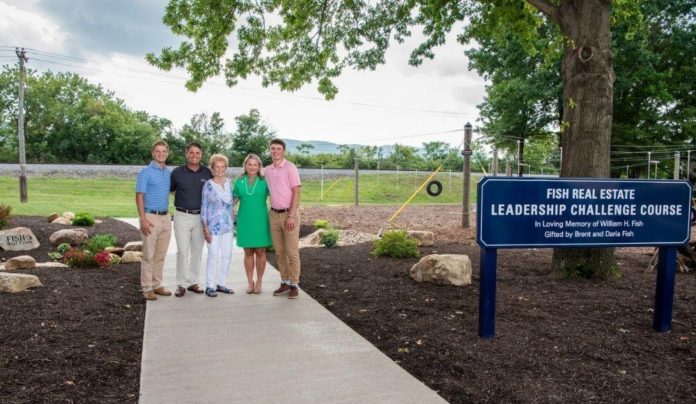Williamsport, Pa. – Leadership training takes a new path at Pennsylvania College of Technology with the Fish Real Estate Leadership Challenge Course,
The course was dedicated on Aug. 11 on the wooded part of the southcentral side of the college campus.
The course, funded by Brent and Daria Fish, in memory of Brent’s father, “will foster leadership and team-building skills for generations of students, faculty, alumni and industry partners,” said Loni N. Kline, vice president for college relations.
Fish is president of Fish Real Estate; Daria Fish is head of corporate communications for OxiWear.
According to the college, a focus was reflected throughout the development and construction process, which involved the college’s General Services Department, architectural technology and concrete science classes, a helping of off-campus inspiration, and a picnic table donated by the Sigma Pi philanthropic fraternity.
The intricate design includes a bridge which honors “the Fish family’s appreciation for the outdoors: stainless steel railings resembling fly-fishing rods, with hooks dangling from lines that drop to a dry creek bed below.”
“We are standing before an innovative addition to our hands-on learning portfolio, one that deepens the applied technology experience and creates unique opportunities for our students to discover their leadership styles and test their communication skills,” said outgoing college president Davie Jane Gilmour.
“A stimulating learning experience that will foster trusted and meaningful relationships. Bill Fish knew the value of creating a world in which we all want to live, and now his legacy inspires students to follow,” Gilmour added.
The 14,400-square-foot course was conceived and propelled by Rob Cooley, associate professor of anthropology and environmental science, who “was inspired by transformational experiences among students in study-abroad expeditions and his Outdoor Recreation as a Therapeutic Tool course.”
The college said he was also aided in this vision through research and consultation with Tony Draus, from the Bloomsburg-based EdVenture Builders, during a Spring 2019 sabbatical.
“Penn College exemplifies hands-on, experiential learning,” Cooley said. “I feel outdoor challenge education adds hands-on experiences that build empathy, self-awareness, leadership, self-confidence and teamwork. The value of these connections far exceeds the ‘High-five, wasn’t that awesome?’ feel-good kind of story when you get into the theory behind it all.”
In addition to curricular benefits, the course will be used for such diverse purposes as student activities, ROTC maneuvers, Residence Life programming, club events, summer camps, corporate training and faculty retreats.
“I am absolutely honored and humbled that the Fish family has chosen to make my dream a reality, and I look forward to working hard to maximize the utilization of this resource,” Cooley said. “Everything about this effort has been about collaboration, teamwork and shared goals, and I am delighted to have this resource to share with the college, our students and our guests.”
Three students, human services and restorative justice majors Colin G. Browne Jr., a New York City native now living in Williamsport; Cody R. Englehart, of Montgomery; and Krystle J. Richardson, of Cogan Station, “shared valuable lessons learned through their adventures outside the classroom.”
While joking in the afternoon’s 90-degree heat that “perhaps we should have supported a pool project,” Fish said he was impressed by the students testimonials, and that the course “Amplifies Penn College’s holistic approach to applied technology education.”
“At a time when there’s a ‘little more angst’ in the world, the teaching of interaction and communication is increasingly necessary and important,” he said. “It’s not the message itself, but how it’s delivered. Why not provide a vehicle to be effective leaders and communicators?,”Fish said.
Brent and Daria Fish ascend a seesaw platform to begin a team-building exercise at the Fish Real Estate Leadership Challenge Course, located on the campus of Pennsylvania College of Technology. Assisting in the activity are students, community volunteers and Rob Cooley (second from left), the Penn College faculty member who spearheaded the leadership-engaging resource.
“It’s an attention-getter. If you drive by or walk by, it gets everyone’s attention. ‘What is that over there?’” said Andrea L. Dildine, horticulturist/grounds and motorpool manager.
“For this site, the terrain was pretty flat, so we wanted it to undulate and look like water would come through the dry creek bed and go under the bridge. And maybe some people would say, ‘Was there water really here?’ We just want people to use their imagination when they come to different areas on campus,” Dildine added.
While users of the space will work on their group dynamics, Chad L. Karstetter, horticulturist/motor pool lead person, said he “Cherished the inherent brainstorming,” that he and his creative colleagues tackle each new endeavor.
“Penn College is a big playground for us. We do get to experiment. We come up with ideas, and we have great support from Penn College to put our ideas to work,” he said. “It’s fun. Every project that we work on, there is a part of it that’s really unique and that we’re all passionate about.”
Support for the Challenge Course came from Dorothy J. Gerring, associate professor of architectural technology, whose students prepared renderings of the concept; Franklin H. Reber Jr., building construction technology instructor, who led students in pouring the concrete sidewalks and bridge; and Chad M. Aloisio, a General Services service and design technician, who created the fishing-rod railings and other enhancements.
The formal dedication took place on the bridge, which the principals opened by unclasping carabiners, as Kline called particular attention to the setting.
“Let this be symbolic of bridging the gap between innovative concept and real-world application,” Gerring said.
Credit: Source link
































